The Difference Between Pastry and Cake: Explained
What is Pastry?
Pastry is a type of baked dough, often made with flour, butter or shortening, and water. It is typically used to make sweet or savory treats, such as pies, tarts, and croissants. Pastry recipes can vary widely, but all involve folding and layering the dough in order to create a light, flaky texture. Pastries can be made with a variety of fillings, such as fruit, cream, or meat, and are often served as desserts or brunch items.
What is Cake?
Cake is a sweet, dessert staple made from flour, sugar, eggs, and butter. Typically, cakes are baked in a round or rectangular pan, allowing them to rise and develop a fluffy, moist texture. Cakes can be flavored and decorated in a myriad of ways and often include frosting made with butter, confectioners’ sugar, and milk. Classic cake varieties include chocolate, vanilla, and red velvet, but bakers can get creative with ingredients like pumpkin, carrot, or even lavender.
The Main Differences Between Pastry and Cake
The main difference between pastry and cake lies in their preparation and serving style. Pastry is typically made with a laminated dough made up of layers of butter or shortening, while cake is created with a batter that is poured into a pan and then baked. Pastry is often served in smaller portions, while cake is often served in larger slices or as a whole dessert.
Another difference is in the fillings – pastries are often filled with either sweet or savory fillings that complement the flaky texture of the dough, while cakes are usually flavored with fruits, nuts, or spices, and contain a layer of frosting on top.
In terms of baking requirements, pastries require precise temperature control and timing to ensure they come out crisp and flaky, while cakes require careful measurement of ingredients and baking time to ensure they rise properly and achieve the right texture.
Conclusion
In summary, pastry and cake are both delicious desserts that have their own unique preparations, fillings, and serving styles. Whether you’re a lover of flaky croissants or decadent chocolate cake, both pastries and cakes offer a delicious way to indulge your sweet tooth.
Table difference between pastry and cake
| Pastry | Cake |
|---|---|
| Generally has a crispy or flaky exterior | Has a soft and spongy texture |
| May have sweet or savory fillings | Usually has sweet fillings and frosting |
| Typically served as a small, bite-sized dessert | Can be served as a large, multi-layer dessert |
| Examples include croissants, danishes, turnovers, and éclairs | Examples include sponge cake, angel food cake, and chocolate cake |
| Often enjoyed as a breakfast pastry or with tea or coffee | Usually enjoyed as a dessert or for special occasions |
